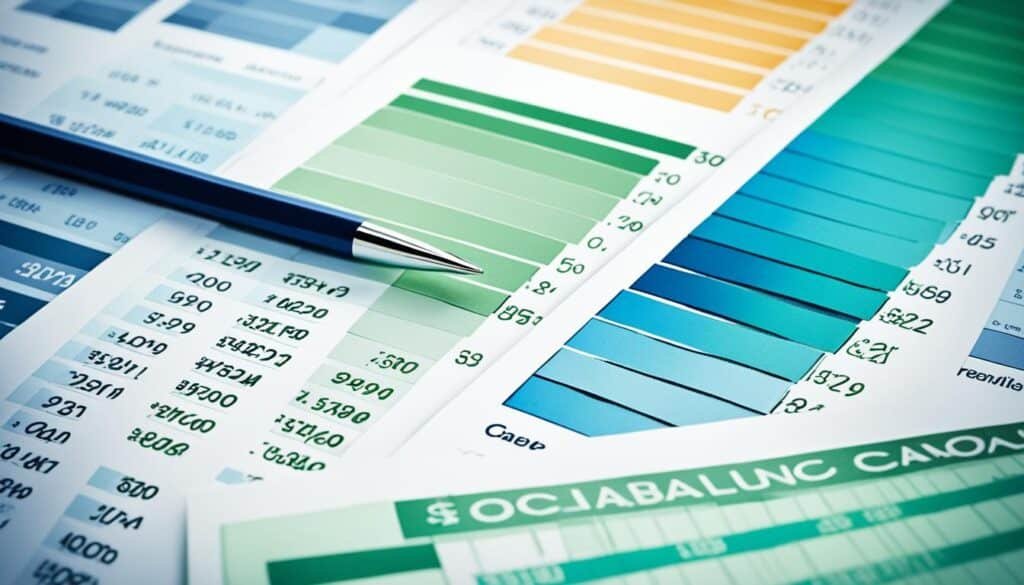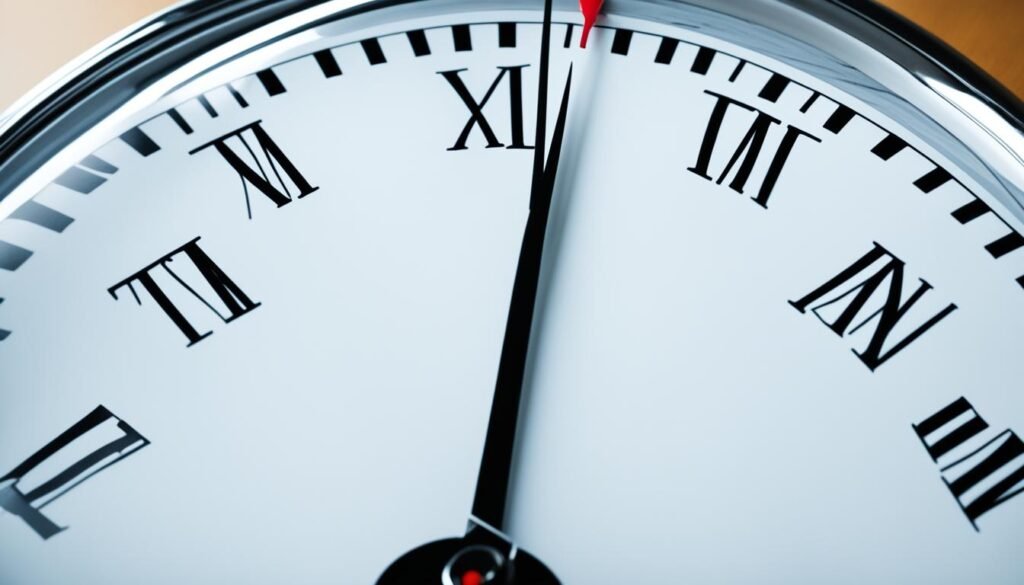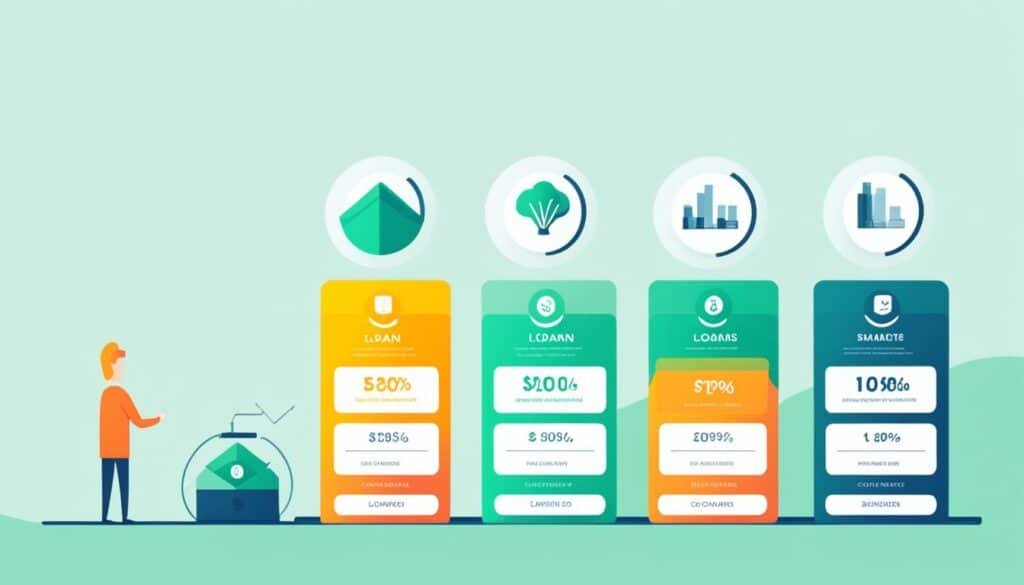Finance Interest rates act just like gasoline prices, going up and down daily and yearly. It’s crucial to know what decides your mortgage interest rate. This knowledge helps when buying a home and negotiating your mortgage loan. What affects your finance interest rate? Lenders look at your credit score, where your home is, its price, and how much you’re borrowing.
They also consider your down payment, loan term, what kind of interest rate you pick, and the type of loan. By understanding these factors, you can find the right mortgage and interest rate. It’s important to shop around to get the best deal for your situation.
Key Takeaways: Finance Interest Rates
- Interest rates can fluctuate over time, affecting the cost of borrowing money.
- Lenders consider several factors when determining your mortgage interest rate, including your credit score, home location, home price, and loan amount.
- Understanding these factors can help you better prepare for the homebuying process and negotiate your mortgage loan.
- Factors such as down payment, loan term, interest rate type, and loan type also play a role in your mortgage interest rate.
- Staying informed about the factors that influence interest rates can help you make informed decisions when shopping for a mortgage.
Understanding Interest Rates
Interest rates are vital in the US economy. They impact how easy or hard it is to borrow money, which affects everyone. It’s important for people and companies to understand what interest rates mean. This helps them make smart choices about money.
Definition of Interest Rates
Think of interest as the price of borrowing money. If you can get a low interest rate, you’ll save money on loans. However, no single person or group decides these rates. They depend on a mix of things like the economy’s health, inflation, and what the Federal Reserve does.
Importance of Interest Rates
When interest rates are low, it’s cheaper to borrow. This can boost the economy by encouraging spending. But, if rates go up, borrowing costs more. This might slow the economy down. Knowing how rates are set helps people and companies make the right money moves. Like deciding on loans, refinancing, or choosing investments.
Understanding interest rates is key for making good financial choices. It helps both individuals and groups handle their money better. This means picking the best strategies for borrowing, lending, and investing to reach their financial dreams.
Credit Scores

Your credit score affects the interest rate you get. Having a high credit score can lead to lower rates. Lenders check your credit score to see how likely you are to pay them back. It’s smart to look at your credit report before getting a mortgage. Fix any mistakes and try to boost your credit score if needed. A better credit score means you could save a lot of money during your loan.
Factors that Influence Your Credit Score
- Payment history: Your record of on-time payments on loans, credit cards, and other financial obligations.
- Amounts owed: The total amount of credit you’re using compared to your available credit limits.
- Length of credit history: The longer you’ve had credit accounts, the better it is for your credit score.
- Types of credit used: A mix of different types of credit, such as credit cards, loans, and mortgages, can positively impact your credit score.
- New credit: Applying for and opening new credit accounts can temporarily lower your credit score.
Knowing what affects your credit score helps. It lets you work on making your score better. This can lead to getting lower interest rates on your mortgage.
“Your credit score is one of the most important factors in determining your interest rate on a mortgage. It’s crucial to monitor and maintain a strong credit score before and during the home-buying process.”
It’s wise to regularly check your credit reports and credit scores. This can help spot mistakes and areas to fix. Doing so can save you money on mortgage interest.
Home Location
The area where your future home is located can affect the interest rate on your loan. Lenders might offer different rates based on your home’s state or county. This change in interest rates is due to regional economic health, local housing market conditions, and the lender’s risk evaluation.
Looking at homes in rural areas? Be sure to compare rates from various local lenders. They could offer you better deals than national lenders, because they know the local market better. By checking with different lenders, you might find a better loan match for your home location.
If you’re considering rural or urban areas, talking to numerous lenders will show you what’s out there. You might come across special loan programs made for where you want to live or for certain types of buyers. Researching and comparing lender options can help you choose a loan that’s right for you and your home location.
“Knowing how your home location can change interest rates is key in the real estate market. Finding local lenders can help you discover affordable financing for your situation.”
Home Price and Loan Amount

Getting a mortgage loan depends a lot on the home price and how much you’ll need to borrow. The loan amount includes the home’s cost, closing costs, and less your down payment.
Impact of Home Price
The price of your home influences the interest rates you’ll get. Small and large loans may face higher rates. Using an interest rate tool with different prices and down payments can show you how rates change.
Loan Amount Considerations
Whether you include closing costs and mortgage insurance in your loan amount depends on your situation. While looking for a loan, be sure to consider all costs to avoid surprises. Understanding how your loan amount and house price affect rates can help you choose better.
| Home Price | Loan Amount | Closing Costs | Mortgage Insurance | Interest Rate |
|---|---|---|---|---|
| $300,000 | $240,000 | $6,000 | $100/month | 4.5% |
| $400,000 | $320,000 | $8,000 | $125/month | 5.0% |
| $500,000 | $400,000 | $10,000 | $150/month | 5.5% |
The table above shows how the price, loan, and extra costs affect interest rates. Usually, as prices and loan amounts go up, so do the rates. Knowing these key points can help buyers choose better mortgage deals. Of course, aiming for the lowest interest rate is always a good idea.
Down Payment

The down payment is key when getting a mortgage. It plays a big role in how much the loan costs. The bigger your down payment, the less interest you’ll pay. This is because a big down payment means less risk for the lender. If you can’t put down 20% or more, you’ll likely need mortgage insurance. This increases your monthly payments and the total cost to borrow. Remember, mortgage insurance only protects the lender.
Choosing the right down payment is crucial. Even though a small down payment might seem easier, it can lead to higher costs over time. Think about the extra costs like mortgage insurance and higher interest rates.
“The down payment is a critical factor in securing a mortgage, as it directly affects the interest rate and the overall cost of the loan.”
When picking a loan, focus on more than just the interest rate. Think about the total cost to borrow, which includes mortgage insurance. This approach will lead to a better financial choice. In the end, choosing your down payment wisely is crucial. Be sure to look at the total cost to borrow and any mortgage insurance. This way, you can pick the best mortgage for your financial future.
Loan Term

The term, or how long you have to pay back the loan, is very important. Shorter loans have lower interest rates and total costs. But, monthly payments are higher. Longer loans have lower monthly payments but you pay more interest over their life. Your choice depends on your money goals. For instance, 15-year loans save a lot on interest compared to 30-year loans. Yet, you’ll pay more each month. This can be hard if your income is limited.
| Loan Term | Interest Rates | Monthly Payments | Total Interest Costs |
|---|---|---|---|
| 15-year Mortgage | 4.5% | $1,432 | $57,760 |
| 30-year Mortgage | 5.0% | $1,074 | $127,640 |
This table shows the differences between 15-year and 30-year mortgages. A 15-year loan has lower interest and less total cost. But, monthly payments are almost $400 more. You must think hard to pick the best term. It should fit your loan needs, monthly payments, and interest costs. Finding the right loan term is key for your finances. Know how it affects your payments and interest. This way, your choice will meet your financial needs and dreams.
Finance Interest Rates
Mortgage interest rates are vital when buying a home. They can greatly change the loan’s total cost. These rates change based on many market and financial conditions, which decide what rate a borrower gets. The economy’s state hugely affects these rates. In a strong economy, rates go up. This is because to keep inflation in check, the Federal Reserve might raise the federal funds rate. On the flip side, in bad economic times, rates usually drop to help the economy.
Another important factor is inflation. When prices of things go up, the Federal Reserve may raise rates. This is to slow inflation by making it costlier to borrow for consumers and businesses. Treasury bonds and mortgage-backed securities also impact rates. If their yields go up, mortgage rates do too. This is because lenders then need to offer better returns to attract investors.
Your personal finance also matters. Things like your credit score and down payment size affect your rate. Those with good credit and a big down payment often get lower rates because they are seen as less risky by lenders.
| Factor | Impact on Mortgage Interest Rates |
|---|---|
| Economic Conditions | Strong economy: Rates tend to rise Weak economy: Rates often decrease |
| Inflation | Rising inflation: Rates typically increase Falling inflation: Rates may decrease |
| Treasury Bonds and MBS Performance | Increasing yields: Rates go up Decreasing yields: Rates may go down |
| Credit Score | Higher score: Lower rates Lower score: Higher rates |
| Down Payment | Larger down payment: Lower rates Smaller down payment: Higher rates |
Knowing what shapes mortgage rates helps borrowers. It arms them with the information they need to seek the best rate for their loan. This understanding can save a lot of money over the loan’s life.
“Mortgage interest rates are not set in stone. By understanding the factors behind them, borrowers can make smarter choices. They might even get a better rate.”
Loan Type

When buying a home, you can choose from several loan categories. These include conventional loans and those backed by the government, such as FHA, USDA, and VA loans. Knowing the differences helps you pick the best loan for your situation and goals.
Conventional Loans
Conventional loans are not guaranteed by the government. They are offered by private lenders like banks and credit unions. You usually need a better credit score and a larger down payment for these loans. Yet, they can be more flexible in what properties qualify and what interest rates they offer.
FHA, USDA, and VA Loans
FHA, USDA, and VA loans have government backing offering good terms and low down payments. They are great if you’re buying your first home or have little saved for a down payment. Make sure to compare what different lenders offer in terms of interest rates and fees.
- FHA Loans: These are backed by the Federal Housing Administration. They typically require a smaller down payment and have more relaxed credit score requirements than conventional loans.
- USDA Loans: The U.S. Department of Agriculture backs these loans. They are for those who want to buy a home in rural areas and meet certain income criteria.
- VA Loans: These loans are guaranteed by the U.S. Department of Veterans Affairs. They help military personnel, veterans, and their families buy homes with no down payment.
Your loan choice depends on your financial situation and what kind of home you want. Be sure to look at different options and consult a mortgage expert to find the right fit.
“Exploring the various loan types can help homebuyers find the financing solution that best suits their needs and budget.”
Points and Lender Credits

When looking at mortgages, you’ll hear about “points” and “lender credits.” They’re key ideas affecting the cost of your loan. Be sure to think about these when choosing a mortgage. Mortgage points are fees paid up front to lower your interest rate. They cost around 1% of your loan amount. Paying points means your rate goes down by about 0.25%. This deal is good for those staying in the home a long time.
Lender Credits are offers to help with your closing costs. The lender might give a higher interest rate but cover some fees. This is useful if you can’t pay all the initial mortgage costs and won’t stay in the home very long. It’s important to understand what you’re choosing between mortgage points and lender credits. Knowing for how long you plan to stay, what you have for costs, and managing debt is key. This info helps decide the best financing for you.
| Mortgage Points | Lender Credits |
|---|---|
|
|
By reviewing the benefits and drawbacks of mortgage points and lender credits, you can make a smart choice. This choice fits your financial goals and future plans better. It can help lower your closing costs and improve your mortgage journey.
Also Read: What’s Finance And How Does It Impact The Stock Market?
Conclusion
Mortgage interest rates change often and are influenced by many things. It’s important to know what affects these rates. This helps borrowers get better loan terms for their homes. Keeping track of your credit score and looking at home prices and loan amounts is key. Also, knowing how down payments and loan types affect rates is important. By working with several lenders, you can use your credit position to get better rates. This saves money over time. Understanding mortgage rates is crucial for anyone looking to buy a home. Staying updated on financial news and your personal situation is vital. This way, you can make smart choices that meet your financial goals.
FAQs
What factors determine mortgage interest rates?
Your mortgage interest rate is based on several key factors. These include your credit score, where your home is located, its price, and your loan amount. Also, your down payment, the term of your loan, and what type of interest rate you choose count. Not to forget, the type of loan you pick plays a big part, too.
What is the definition of interest rates and why are they important?
Interest rates show the cost to borrow money. Getting a low rate means you save more when you borrow. These rates are not set by one group. They change due to many economic reasons. These include how the economy is doing, inflation, and what the Federal Reserve decides.
How does my credit score affect my mortgage interest rate?
Lenders look at your credit score to decide your interest rate. A higher score usually means a lower rate. This is because a good credit score shows you’re likely to pay your loan back on time.
How does my home location affect my mortgage interest rate?
Where you live can impact the interest rates you’re offered. Rates may vary by state or even by county. If you’re house hunting in a rural area, check with various lenders. Local ones might have better rates and loan options.
How does the home price and loan amount affect my mortgage interest rate?
The prices differ for homes and loans can impact your interest rate. Larger or smaller loans might have higher rates. Using a rate calculator with different home prices and down payments can show this effect.
How does my down payment amount affect my mortgage interest rate?
Putting down a bigger payment can get you a lower rate. This is because you show you’re invested in your home. If you can’t put down 20%, you may need mortgage insurance. This increases your monthly payments.
How does the loan term affect my mortgage interest rate?
Short term loans usually have lower rates and cost you less overall. But, they have higher monthly payments. Short loans mean you’d pay less interest. It all depends on what you can afford monthly.
What are the key factors that affect mortgage interest rates?
Several things affect mortgage rates. These include the economy’s health, inflation, and the Federal Reserve’s actions. The bond and securities markets, plus your personal finances, play a role. Your credit score and down payment also matter to lenders deciding your rate.
How do different loan types affect my mortgage interest rate?
Different loans types have different rates. Conventional loans, and FHA, USDA, and VA loans all have their own rates. Talking to different lenders shows you all your options. This helps in understanding the various interest rates.
What are mortgage points and lender credits, and how do they affect my interest rate?
When finding a mortgage, you’ll see different rates based on points. Points let you pay less interest with an upfront cost. Lender credits, on the other hand, raise your rate but decrease closing costs. Knowing these options helps you pick what’s best for you.
Source Links
- https://www.consumerfinance.gov/about-us/blog/7-factors-determine-your-mortgage-interest-rate/
- https://www.bankrate.com/mortgages/how-interest-rates-are-set/
- https://www.experian.com/blogs/ask-experian/what-factors-do-lenders-consider-when-determining-my-interest-rate/
